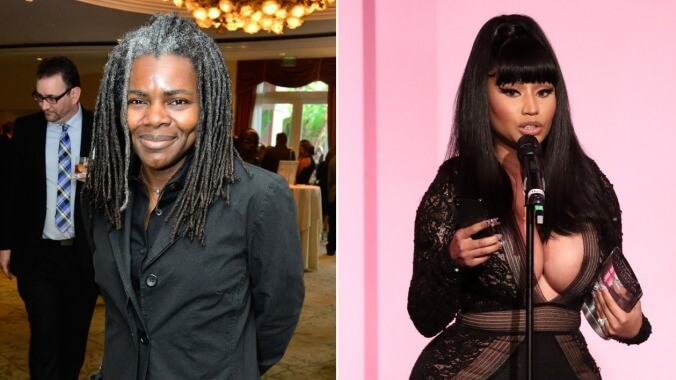Tracy Chapman wins $450,000 in copyright suit against Nicki Minaj

Tracy Chapman has accepted a $450,000 offer of judgment from rapper Nicki Minaj, ending a two-year battle between the two performers over Minaj’s unreleased track “Sorry.” Chapman—notably and historically reticent to have her songs sampled by another artist—sued Minaj in 2018 over the recording and subsequent leaking of the track, which uses elements from her 1988 single “Baby Can I Hold You.” And while a judge had previously ruled that Minaj hadn’t violated copyright by recording the song—originally intended for her fourth studio album, Queen—she and her team were apparently unwilling to take the issue of whether “Sorry”’s subsequent leak did violate Chapman’s rights all the way to trial. (An offer of judgment, in practical terms, is similar to a settlement offer, by the way, although with legal distinctions that we do not want to get yelled at for getting wrong by trying to suss out in this particular parenthetical.)
Per Pitchfork, Minaj has said that her decision not to go forward with the trial was purely financial, i.e., literally saying, “It would have cost us more to go to trial.” (For what it’s worth, Minaj has always contended that she didn’t know she was sampling Chapman when she recorded “Sorry,” and was instead using elements from Shelly Thunder’s “Sorry”—which is a reggae cover of Chapman’s song.) Chapman was a bit more effusive (also per Pitchfork), re-emphasizing that all she’s ever wanted out of any of this was to have her material be left alone:
I am glad to have this matter resolved and grateful for this legal outcome which affirms that artists’ rights are protected by law and should be respected by other artists. I was asked in this situation numerous times for permission to use my song; in each instance, politely and in a timely manner, I unequivocally said no. Apparently Ms. Minaj chose not to hear and used my composition despite my clear and express intentions. As a songwriter and an independent publisher, I have been known to be protective of my work. I have never authorized the use of my songs for samples or requested a sample. This lawsuit was a last resort—pursued in an effort to defend myself and my work and to seek protection for the creative enterprise and expression of songwriters and independent publishers like myself.